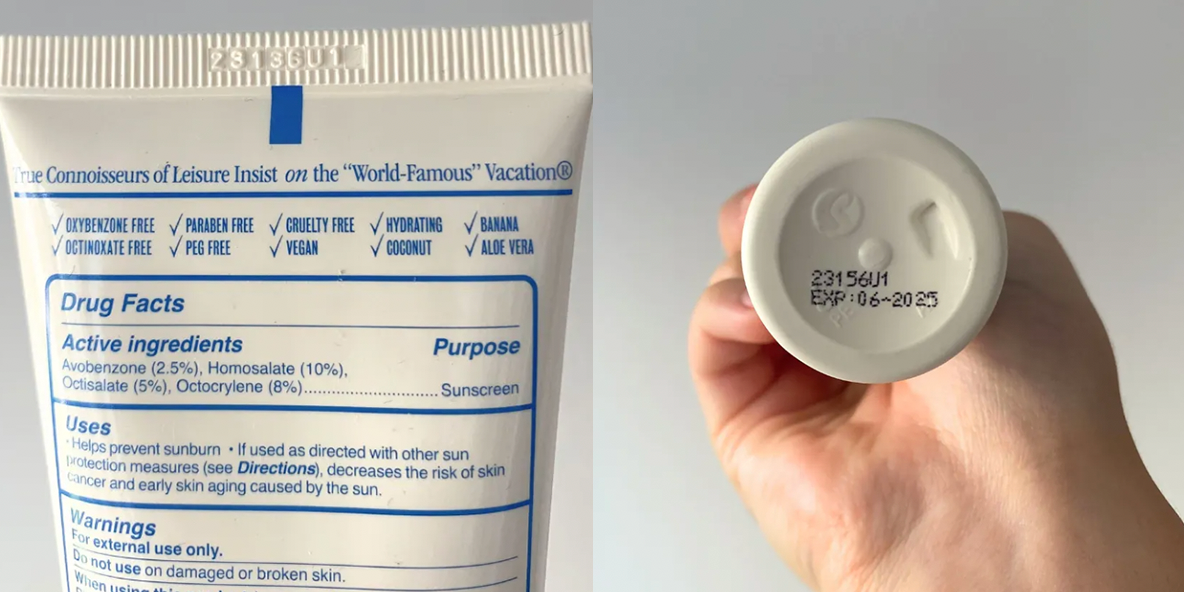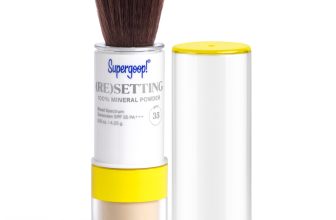Expiration of Sunscreen

Sunscreen expires after 2-3 years once opened, check the expiration date before use. Protecting your skin from harmful UV rays is essential, and sunscreen plays a crucial role in this process.
Expiration of Sunscreen as such, understanding the expiration of sunscreen is vital to ensure its effectiveness and your skin’s protection. Over time, the active ingredients in sunscreen can degrade, reducing its ability to shield your skin from the sun’s damaging effects. By being aware of sunscreen expiration dates and properly storing your sunscreen, you can maximize its efficacy and safeguard your skin from sunburns and premature aging.
Let’s delve deeper into the importance of sunscreen expiration and how to make the most of your sun protection routine.

The Importance Of Sunscreen In Skin Protection
Role In Blocking Uv Rays
Sunscreen acts as a protective barrier, blocking harmful UV rays from penetrating the skin and causing damage.
Preventing Skin Damage
Regular use of sunscreens can prevent skin damage, such as sunburn, premature aging, and skin cancer.

What Does Sunscreen Expiration Mean?
Sunscreen expiration signifies the point when its effectiveness decreases. Expired sunscreen may not provide adequate protection. It is essential to replace sunscreen regularly for optimal sun protection.
Changes In Chemical Composition
As sunscreen nears expiration, its chemical composition can alter, impacting its efficacy.
Expired sunscreens may lead to skin irritation due to changed chemical structure.
Loss Of Effectiveness
Expired sunscreen may not provide the intended protection due to loss of effectiveness.
What Does Sunscreen Expiration Mean?
When sunscreen expires, its chemical composition and effectiveness can be compromised.
How To Identify Expired Sunscreen
Using sunscreen is a vital part of staying safe in the sun, but did you know that sunscreen can expire? It’s true, and using expired sunscreen can be ineffective in protecting you from the sun’s harmful UV rays. In this section, we’ll discuss how to identify expired sunscreen so that you can stay protected all summer long.
Checking The Expiry Date
The easiest way to identify expired sunscreen is to check the expiry date. Most sunscreens have a shelf life of around three years, so be sure to check the date before using it. You can usually find the expiry date on the bottom or back of the bottle, and it’s usually labeled as “EXP” followed by a date. If the date has passed, it’s time to toss the sunscreen and buy a new one.
Changes In Texture, Smell, And Color
If you’re unsure about the expiry date or if the sunscreen has been sitting around for a while, there are a few signs that can indicate it has expired. One of the most noticeable changes is a difference in texture. Expired sunscreen may become thicker or thinner than usual, making it difficult to apply evenly. Additionally, expired sunscreen can change color or develop a strange odor. If you notice any of these changes, it’s best to err on the side of caution and replace the sunscreen.
Remember, using expired sunscreen can be ineffective in protecting you from the sun’s harmful UV rays. Be sure to check the expiry date and look out for changes in texture, smell, and color to keep yourself safe in the sun.

Risks Of Using Expired Sunscreen
When it comes to protecting your skin from the harmful effects of the sun, using sunscreen is crucial. However, it’s important to be aware of the risks associated with using expired sunscreen. The efficacy of sunscreen can diminish over time, leading to reduced sun protection and potential skin irritations.
Reduced Sun Protection
Expired sunscreen may not provide the level of sun protection indicated on the label. Exposure to harmful UV rays without adequate protection can increase the risk of sunburn, premature skin aging, and skin cancer. It’s essential to check the expiration date and replace sunscreen that has passed its expiration to ensure optimal protection against UV radiation.
Potential Skin Irritations
Using expired sunscreen can lead to various skin irritations such as rashes, allergic reactions, and breakouts. The chemical composition of sunscreen can change over time, potentially causing irritation to the skin. To avoid these issues, it’s advisable to discard expired sunscreen and invest in a fresh and effective product.
Proper Storage To Extend Sunscreen Life
Proper storage is crucial to extend the life of your sunscreen and ensure its effectiveness. By following the right storage practices, you can prevent premature expiration and maximize the protective benefits of your sunscreen. Let’s delve into the ideal storage conditions and essential tips to prevent early expiry of your sunscreen.
Ideal Storage Conditions
Storing your sunscreen properly can significantly extend its shelf life and potency. Here are the ideal storage conditions to keep your sunscreen in top-notch condition:
- Keep it away from direct sunlight: Sunscreen should be stored in a cool, dark place to prevent UV exposure, which can degrade its active ingredients.
- Avoid extreme temperatures: Fluctuations in temperature can compromise the quality of sunscreen. Store it at room temperature to maintain its efficacy.
- Secure the cap tightly: Properly sealing the container can prevent air and moisture from entering, preserving the formulation of the sunscreen.
Tips To Prevent Early Expiry
By following these essential tips, you can prevent premature expiration of your sunscreen and ensure its longevity:
- Check the expiration date: Always inspect the expiration date and discard expired sunscreen to avoid using ineffective products.
- Avoid leaving it in hot cars: Exposure to high temperatures in vehicles can accelerate the degradation of sunscreen, so remember to take it with you.
- Refrain from storing in the bathroom: Humidity in the bathroom can affect the stability of sunscreen, so store it in a dry location instead.
Choosing The Right Sunscreen
When it comes to protecting your skin from the sun’s harmful rays, sunscreen is a must-have. However, did you know that sunscreen has an expiration date? Using expired sunscreen not only reduces its effectiveness but can also harm your skin. In this post, we’ll discuss how to choose the right sunscreen and the importance of checking its expiration date.
Understanding Spf Ratings
Sun Protection Factor (SPF) is a measure of how well a sunscreen will protect your skin from the sun’s UVB rays. The higher the SPF rating, the greater the level of protection. For example, SPF 30 will block about 97% of UVB rays, while SPF 50 will block around 98%. However, it’s essential to remember that no sunscreen can provide 100% protection.
Types Of Sunscreens Available
There are two types of sunscreens available: chemical and physical. Chemical sunscreens work by absorbing UV rays, while physical sunscreens reflect them. Chemical sunscreens are typically more comfortable to wear and do not leave a white residue on the skin. On the other hand, physical sunscreens are better for people with sensitive skin and offer immediate protection upon application.
When selecting a sunscreen, it’s essential to consider your skin type, the level of activity you’ll be doing, and the length of time you’ll be exposed to the sun. For example, if you have sensitive skin, you may want to choose a physical sunscreen with an SPF of at least 30. If you’ll be in the water, you’ll need a water-resistant sunscreen that provides broad-spectrum protection.
Checking Expiration Dates
It’s crucial to check the expiration date of your sunscreen before using it. Expired sunscreen can lose its effectiveness and can even cause skin irritation. Most sunscreens have a shelf life of around three years, but this can vary depending on the manufacturer. Always store your sunscreen in a cool, dry place, and avoid exposing it to high temperatures or direct sunlight.
In conclusion, choosing the right sunscreen is crucial for protecting your skin from the sun’s harmful rays. Understanding SPF ratings, the types of sunscreens available, and checking expiration dates can help you make an informed decision. Remember to apply sunscreen generously and frequently, especially if you’re spending time outdoors.
When To Replace Your Sunscreen
It’s crucial to know when to replace your sunscreen to ensure maximum protection from the sun’s harmful rays.
Seasonal Replacement Tips
Consider replacing your sunscreen every season to maintain its effectiveness.
Monitoring Sunscreen Usage
Keep track of your sunscreen usage to know when it’s time for a new bottle.
Educating Others About Sunscreen Safety
Informing Friends And Family
When it comes to sunscreen safety, it’s crucial to inform your friends and family about the expiration of sunscreen. Expired sunscreen can be ineffective in protecting against harmful UV rays, which can lead to skin damage and sunburns. By sharing this knowledge with your loved ones, you can help them prioritize using fresh sunscreen for adequate protection.
Promoting Awareness In Community
Additionally, promoting awareness in the community is essential for ensuring sun safety. You can organize informational sessions or distribute leaflets at local events to educate people about the significance of using sunscreen within its expiry date. By spreading awareness, you can contribute to the overall well-being of your community members and prevent potential skin damage.
Frequently Asked Questions
Is It Okay To Use Expired Sunscreen?
Using expired sunscreen is not recommended as it may be less effective. The ingredients could have degraded, leading to reduced protection. It’s best to use sunscreen within its expiration date for optimal sun protection.
What Happens If You Use Out Of Date Sun Cream?
Using out-of-date sun cream may lead to reduced effectiveness and increased risk of sunburn or skin damage.
Does Sunscreen Expire Fda?
Sunscreen does expire according to the FDA. Check the expiration date on the packaging for effectiveness.
How Long Can You Use After The Expiration Date?
Using products after the expiration date is not recommended for safety and effectiveness. It’s best to discard them and purchase new ones.
Conclusion
Being aware of sunscreen expiration is crucial for effective sun protection. Regularly check the expiry date and storage conditions to ensure product efficacy. Remember, using expired sunscreen may lead to sunburns and skin damage. Stay safe and informed for healthy skin all year round.







